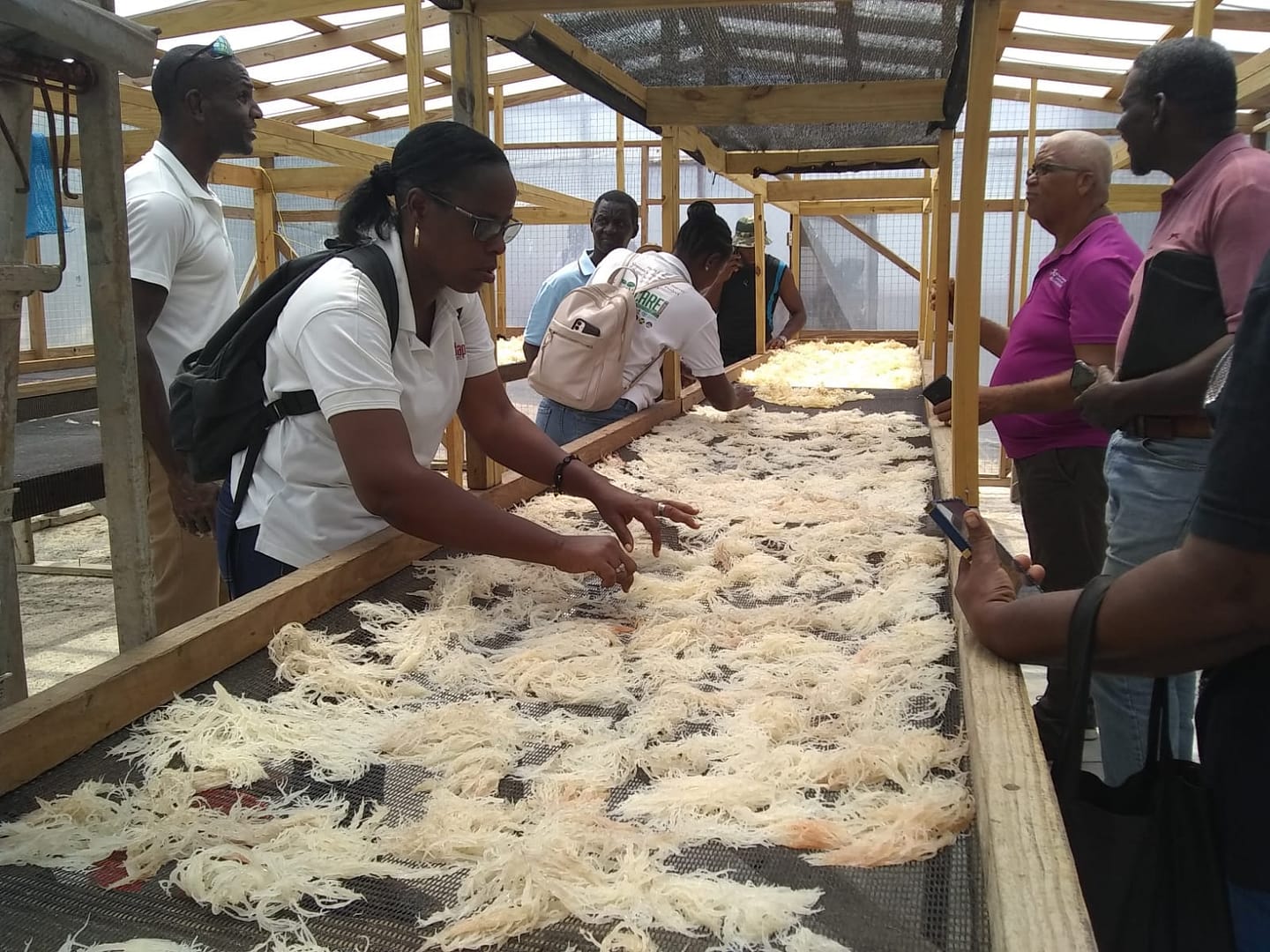
Grenada advances sea moss production with the training of farmers and technicians
Over 40 sea moss farmers and technicians gathered for four days of field and classroom training on best practices in sea moss production as a key step in increasing and improving production and strengthening the country’s sea moss value chain.
18 June 2024 – Bridgetown, Barbados – Sea moss held the spotlight for some stakeholders in Grenada over the past two weeks as the Food and Agriculture Organization of the United Nations (FAO), in collaboration with the Ministry of Agriculture and Lands, Forestry, Marine Resources and Cooperatives, worked with farmers on improving their practices in sea moss production.
Over 40 sea moss farmers, technicians and extension officers gathered to participate in a week-long training programme, delivered under a project of FAO’s Technical Cooperation Programme on Promoting Competitive, Sustainable and Resilient National Value Chain Development in Grenada.
During the opening ceremony for the training, Mr Justin Rennie, Acting Chief Fisheries Officer, recognised the number of women and youth participants in the workshop and indicated that this “augurs well for the sea moss subsector”. He indicated that “sea moss has been harvested in the wild for years and that this training workshop would help to build the capacity of farmers in Grenada to produce sea moss under controlled conditions”.
The training programme sought to impart best practices for improving sea moss production using the training of trainers (ToT) approach in the form of classroom and field-based instruction. From across the island, sea moss farmers, with varying levels of experience and knowledge of sea moss production, joined to exchange experiences, learn more about setting up different production systems in shallow and deep water and good post-harvest practices.
Ms Jane Maturine, Sea Moss Farmer and Owner of Sea Garden Treasures in Petit Bacaye and Ms Janet Whint, Sea Moss Farmer and Agroprocessor in Fort Jeudy, expressed their gratitude for the training. Ms Maturine shared that it was refreshing to be in the field training alongside fellow sea moss farmers. She remarked that learning new post-harvesting techniques to achieve sea moss conversion ratios that would help them to meet the industry standard was the highlight of the training for her. Ms Maturine expressed delight in now being able to apply these more efficient post-harvest techniques and concluded that the new knowledge and skills would help her and other farmers to increase their yields of dry sea moss.
The training sessions helped to strengthen the collaboration between sea moss farmers and increased their capacity to produce quality sea moss. It also re-emphasized the importance of farmer-to-farmer exchanges and the need for continued dialogue between other stakeholders in the value chain, such as those involved in marketing and exporting.

The trainings were conducted by FAO Sea Moss Production Expert, Mr Thomas Nelson, with coordination support provided by FAO Agricultural Value Chain Development Specialist, Ms Sharlene Prosser. In addition to the trainings, the team also conducted farm visits and consultations in Grenville Bay, Petit Bacaye and True Blue. Mr Nelson also visited approximately ten current and potential sites to assess their suitability and make recommendations for sea moss production. A site mapping and suitability assessment report on these findings will be submitted to the Ministry in the coming weeks.
Commenting on the recent training, Mr Juan Cheaz Pelaez, FAO Trade and Markets Officer for the Caribbean and Lead Technical Officer for the project remarked that, “assisting farmers in understanding the benefits of applying good aquacultural practices in sea moss production is one aspect of the full scope of the work in value chain development that we are doing in Grenada; yet it is an important aspect. When we support farmers to do better production, we are promoting better businesses and better lives for people and their communities. These efforts all come together to strengthen food security, improve market opportunities and the export potential of sea moss, while promoting national production”.
This production training marks the continuation of efforts to strengthen the entire value chain. In the coming months, the FAO team will continue to support the National Sea Moss Value Chain Committee in the implementation of a 5-year upgrading strategy and action plan. Under the plan, immediate follow-up activities by FAO include the development of a business investment profile to support sea moss farmers in accessing credit and finance facilities and increasing market support for farmers by linking them to potential buyers.
Advertise with the mоѕt vіѕіtеd nеwѕ ѕіtе іn Antigua!
We offer fully customizable and flexible digital marketing packages.
Contact us at [email protected]
















Foster “Doc” Derrick the Antigua Government should have being collaborating with your Sea_Moss Farm in Seatons to at least take advantage of this lucrative and abundant crop!
Hopefully, they’ll get the message based upon what Grenada is doing.
Seamoss is a raw material in the food, pharmaceutical, clothing etc industries just to name a few!
Jumbee_Picknee aka Ras Smood
De’ole Dutty Peg🦶🏿Garrat_Bastard
Vere C. Edwards
Comments are closed.